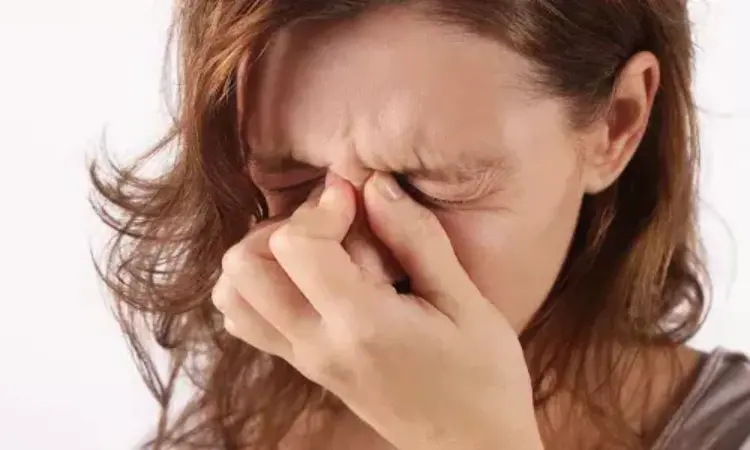- Home
- Medical news & Guidelines
- Anesthesiology
- Cardiology and CTVS
- Critical Care
- Dentistry
- Dermatology
- Diabetes and Endocrinology
- ENT
- Gastroenterology
- Medicine
- Nephrology
- Neurology
- Obstretics-Gynaecology
- Oncology
- Ophthalmology
- Orthopaedics
- Pediatrics-Neonatology
- Psychiatry
- Pulmonology
- Radiology
- Surgery
- Urology
- Laboratory Medicine
- Diet
- Nursing
- Paramedical
- Physiotherapy
- Health news
- Fact Check
- Bone Health Fact Check
- Brain Health Fact Check
- Cancer Related Fact Check
- Child Care Fact Check
- Dental and oral health fact check
- Diabetes and metabolic health fact check
- Diet and Nutrition Fact Check
- Eye and ENT Care Fact Check
- Fitness fact check
- Gut health fact check
- Heart health fact check
- Kidney health fact check
- Medical education fact check
- Men's health fact check
- Respiratory fact check
- Skin and hair care fact check
- Vaccine and Immunization fact check
- Women's health fact check
- AYUSH
- State News
- Andaman and Nicobar Islands
- Andhra Pradesh
- Arunachal Pradesh
- Assam
- Bihar
- Chandigarh
- Chattisgarh
- Dadra and Nagar Haveli
- Daman and Diu
- Delhi
- Goa
- Gujarat
- Haryana
- Himachal Pradesh
- Jammu & Kashmir
- Jharkhand
- Karnataka
- Kerala
- Ladakh
- Lakshadweep
- Madhya Pradesh
- Maharashtra
- Manipur
- Meghalaya
- Mizoram
- Nagaland
- Odisha
- Puducherry
- Punjab
- Rajasthan
- Sikkim
- Tamil Nadu
- Telangana
- Tripura
- Uttar Pradesh
- Uttrakhand
- West Bengal
- Medical Education
- Industry
Blood Eosinophil Count Key Indicator of Inflammatory Severity in chronic rhinosinusitis with nasal polyps: Study

Taiwan: A recent study published in The Laryngoscope has revealed blood eosinophil count (BEC) has become a key clinical marker for assessing the severity of type 2 inflammation in chronic rhinosinusitis with nasal polyps (CRSwNP). It demonstrated the strongest correlation with both tissue eosinophil count and type 2 cytokine levels in nasal polyps.
Comorbid asthma, nonsmoking status, and the ethmoid/maxillary sinus ratio were significant predictors of eosinophilic CRSwNP. These findings highlight the role of BEC in evaluating disease severity and identifying patients at higher risk for more severe forms of the condition.
Severe type 2 eosinophilic chronic rhinosinusitis with nasal polyps (CRSwNP) is difficult to treat and prone to recurrence after surgery. To address this, Chien-Chia Huang, School of Medicine, Chang Gung University, Taoyuan, Taiwan, and colleagues aimed to assess the relationship between clinical markers and the severity of tissue type 2 inflammation in patients with CRSwNP.
For this purpose, the researchers prospectively enrolled adult patients who underwent endoscopic sinus surgery for bilateral CRSwNP. They evaluated the tissue eosinophil count (TEC) and measured the expression levels of type 2 cytokines, including IL-5 and IL-13, in nasal polyps using real-time PCR. The study also assessed the correlations between clinical markers and the severity of tissue type 2 inflammation.
The key findings of the study were as follows:
- A total of 150 participants were enrolled in the study.
- Ninety-five participants (63.3%) had type 2 eosinophilic CRSwNP (defined by TEC ≥10/high power field).
- Weak to moderate correlations were identified between clinical markers and tissue markers of type 2 inflammation.
- Blood eosinophil count (BEC) demonstrated the strongest correlation with tissue type 2 inflammatory severity, as indicated by TEC, IL-5, and IL-13 levels in nasal polyps.
- Comorbid asthma, nonsmoking status, ethmoid/maxillary sinus (E/M) ratio, and BEC were significant predictors of eosinophilic CRSwNP in the regression analysis.
The findings showed that BEC emerges as the leading clinical marker, showing the strongest correlation with tissue type 2 inflammatory severity, as reflected by TEC, IL-5, and IL-13 levels in nasal polyps. Significant predictors of eosinophilic CRSwNP included comorbid asthma, nonsmoking status, E/M ratio, and BEC. These findings could aid clinicians in assessing type 2 inflammation severity in CRSwNP patients and tailoring optimal therapeutic strategies.
Reference:
Wu, W., Huang, C., Chang, H., Lee, J., Fan, H., & Huang, C. Blood Eosinophil Count is the Dominant Clinical Marker for type 2 Inflammatory Severity in CRSwNP. The Laryngoscope. https://doi.org/10.1002/lary.31899
Dr Kamal Kant Kohli-MBBS, DTCD- a chest specialist with more than 30 years of practice and a flair for writing clinical articles, Dr Kamal Kant Kohli joined Medical Dialogues as a Chief Editor of Medical News. Besides writing articles, as an editor, he proofreads and verifies all the medical content published on Medical Dialogues including those coming from journals, studies,medical conferences,guidelines etc. Email: drkohli@medicaldialogues.in. Contact no. 011-43720751


